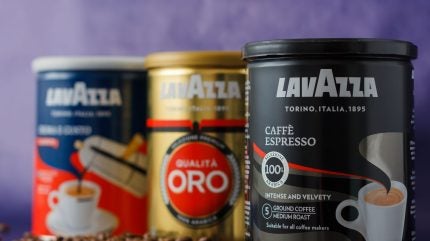
Italian coffee heavyweight Lavazza has reportedly called for another delay to the European Union’s regulation on deforestation-free products (EUDR).
The law is set to come into force in December, after already being delayed.

Discover B2B Marketing That Performs
Combine business intelligence and editorial excellence to reach engaged professionals across 36 leading media platforms.
Under the regulation, businesses selling cocoa, coffee, palm oil and other products in the EU would need to prove their supply chains do not contribute to deforestation.
“We call that the legislation, especially for coffee, be postponed for another year,” Lavazza chairman Giuseppe Lavazza told journalists on Wednesday (9 July), according to reports from Reuters.
The chairman said that the EUDR regulation could potentially have a more damaging effect on the coffee market than tariffs. He also noted countries such as Ethiopia could struggle to comply with the new rules due to ambiguity around land ownership.
He also reportedly said that the cocoa sector was better prepared than coffee, due to fewer countries producing the commodity.

US Tariffs are shifting - will you react or anticipate?
Don’t let policy changes catch you off guard. Stay proactive with real-time data and expert analysis.
By GlobalDataCalls for the EU to further delay its deforestation regulation were also made earlier this week by snacks manufacturing giant Mondelez.
In a statement at the time, Massimiliano di Domenico, Mondelez’s vice president of corporate and government affairs in Europe, said in order to “deliver real impact on the ground, the EUDR regulation must be workable, not just in principle, but in practice”.
However, a letter co-signed by coffee major Nestlé, alongside chocolate producers Ferrero and Tony’s Chocolonely called on The European Commission to ensure “the full preservation and swift, ambitious implementation” of the EUDR.
This week, a group of NGOs including the Voice of Organisations in Coffee Alliance (VOCAL) and environmental advocacy organisation Fern, sent a letter to policy-makers in Brussels, to share its “deep concern” around the delays “and proposed alterations” to the law, “particularly discussions surrounding a ‘zero-risk’ category’.
“This landmark policy is needed in order to enable responsible sourcing, corporate accountability, environmental protection, and equity for coffee producers and origin countries who are committed to sustainable practices,” the letter said.
The groups called on the EU to “resist calls for regulatory reopening or zero-risk classification, which would favour low-transparency markets over those working toward reform”.
It also demanded that the law comes into play “as scheduled”, and that it develops “mechanisms for producer support”, and develops “transparent dialogue with civil society and producer country governments to address implementation challenges collaboratively”.





